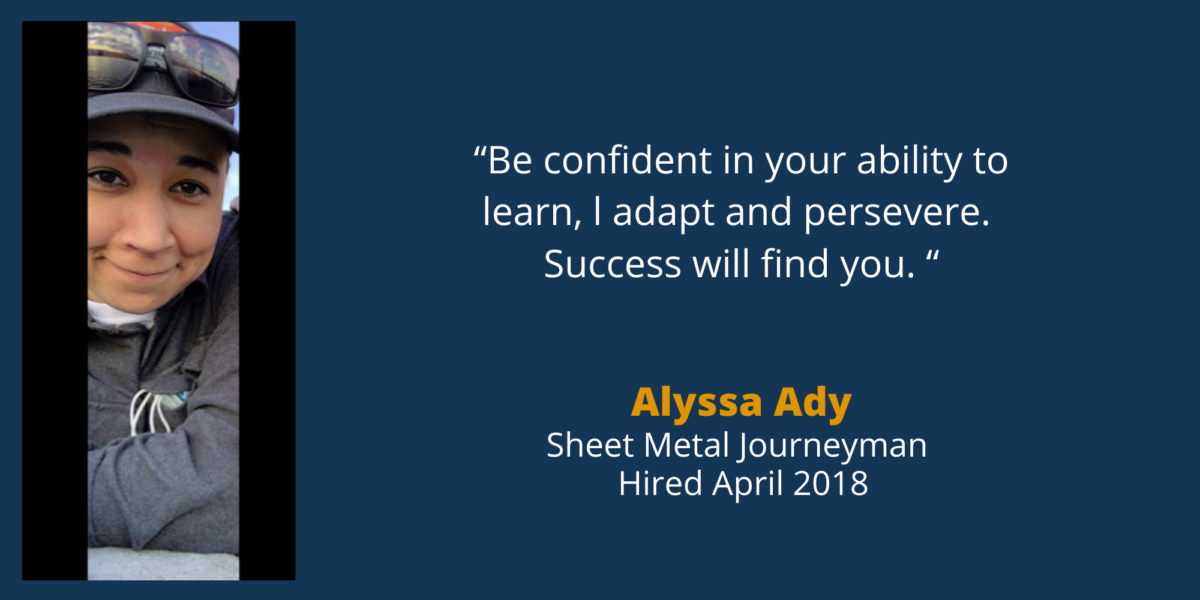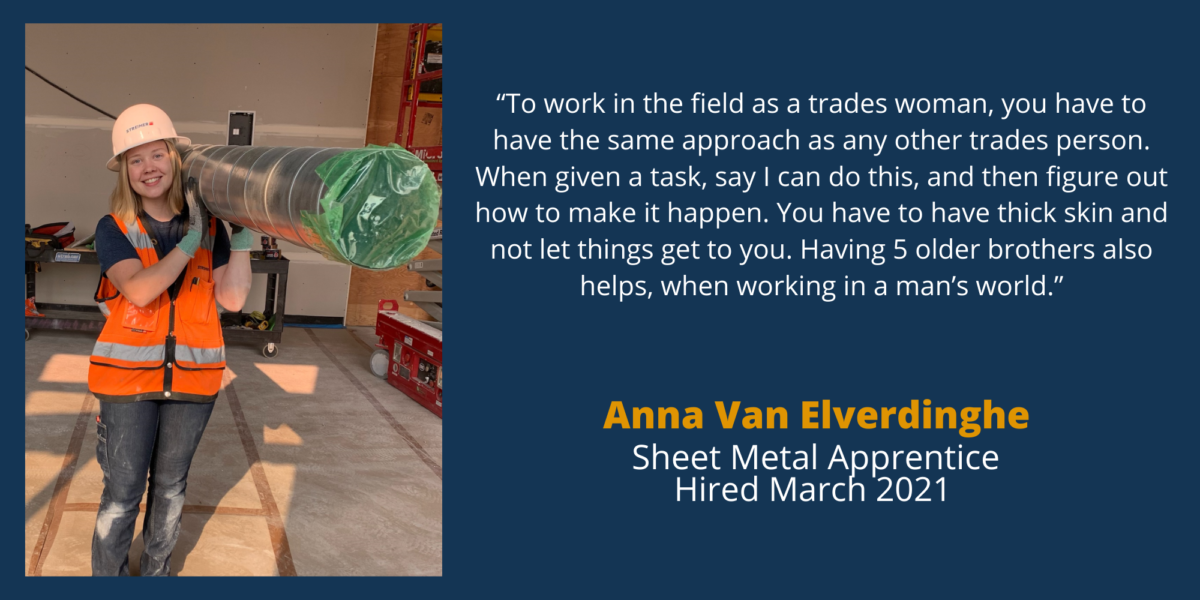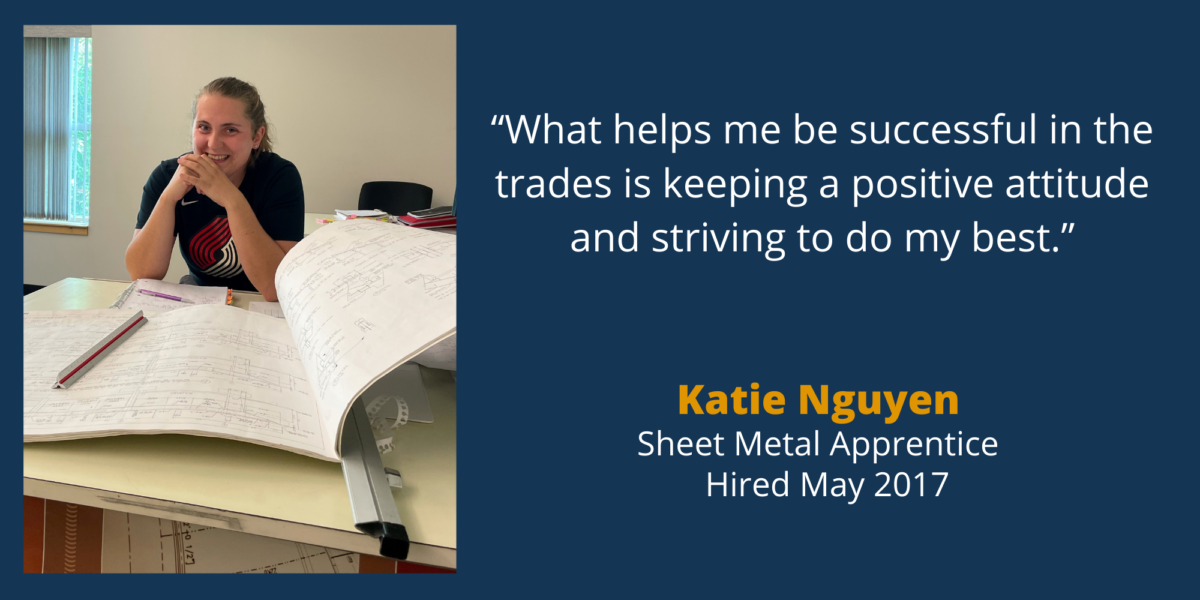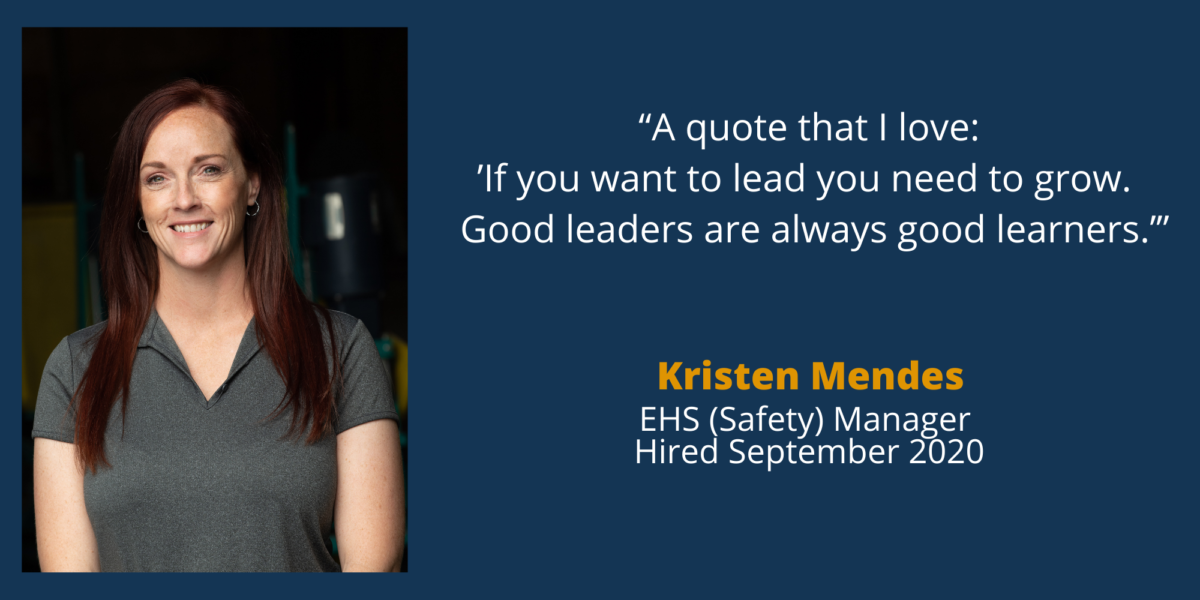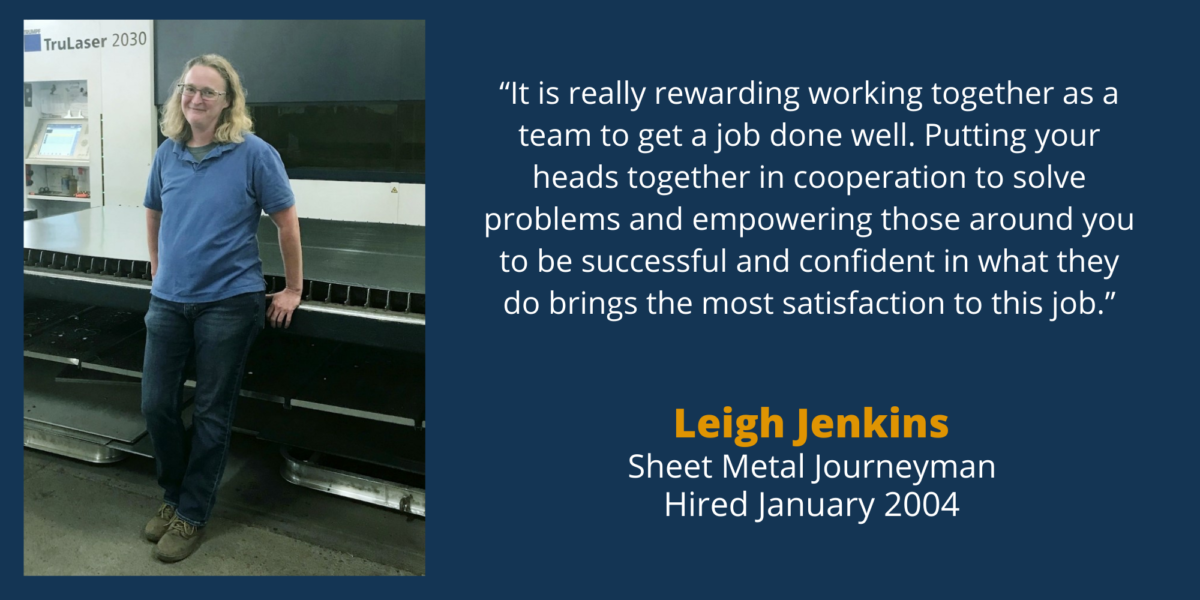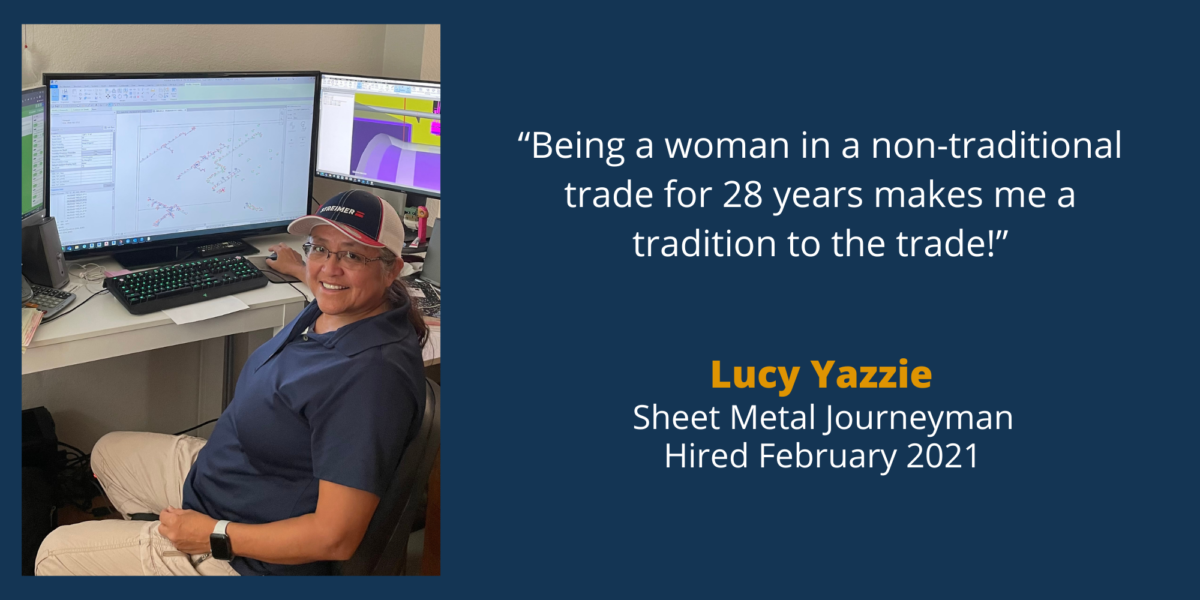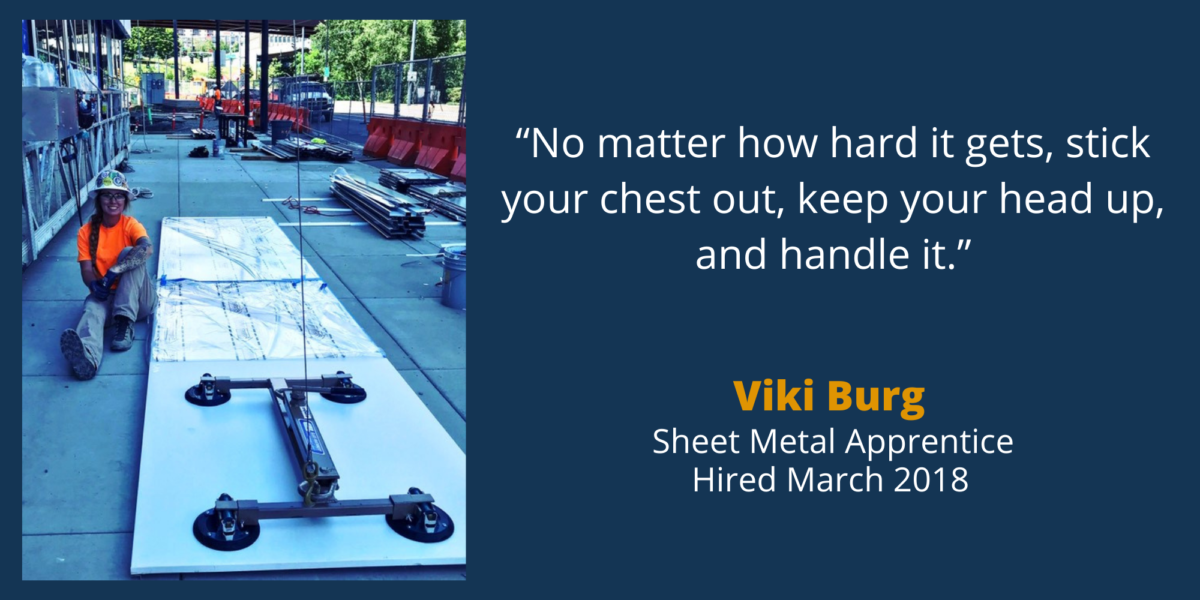Community Partners
Women are the Key to the Future of Construction
Oregon Tradeswomen, in partnership with the U.S. Department of Labor Women’s Bureau and Portland Community College (PCC), celebrated Women in Construction Week at our “We Are the Key” event on March 4th! With the theme of this year’s Women in Construction Week being “Keys to the Future,” tradeswomen and advocates from across the industry gathered to talk about why Oregon women are the key to the future.
Hari Chon, Program Analyst for the U.S. Department of Labor Women’s Bureau, opened the event by sharing the origins of the Women’s Bureau back in 1920, two years before women got the right to vote. Established by the U.S. Department of Labor, the Women’s Bureau was formed to promote the welfare of women and advancing opportunities for women in the workforce. Through research and grants such as the Women in Apprenticeship and Non-Traditional Occupations (WANTO), the Women’s Bureau is actively working in alignment of Oregon Tradeswomen’s vision to improve and increase women’s participation in high-skill, high-wage union careers in the skilled trades. Oregon Tradeswomen is grateful for Hari and the Women’s Bureau for their support.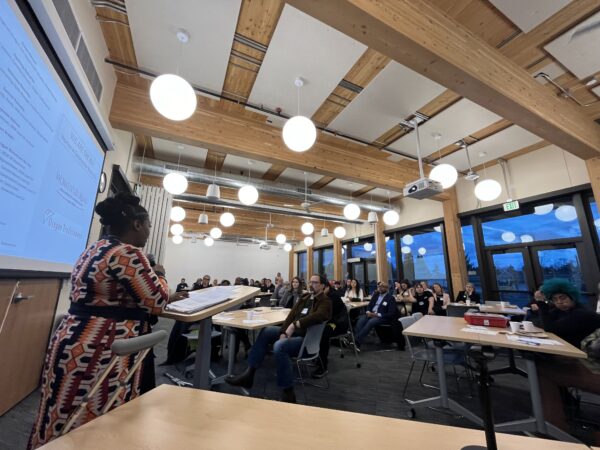
The event took place at Portland Community College’s new Opportunity Center, a space built in alignment with project labor agreements ensuring the work was done with diversity, equity, and inclusion in mind. Amy James Neel, Workforce & Contracting Equity Manager for Portland Community College, detailed that PCC incorporated voices from the community in the design and planning of this project, and worked with contractors, subcontractors, dispatchers, union halls, and apprentice coordinators to maximize opportunity and access for women and BIPOC workers to earn a living wage in these careers. In fact, 10,599 (51.5%) total hours were worked by apprentice women, 4,402 (41.5%) total hours were worked by BIPOC apprentice women. The total hours worked by women were 12,308 (16.8%), meeting and exceeding project goals. We were thrilled to learn that some of the tradeswomen who attended the event worked on the project and were excited to revisit the space that they helped build. To be in a space exemplifying the goals and intentions of Oregon Tradeswomen was inspiring, and we thank PCC for hosting us.
With a venue whose planning and construction not only talked the talk, but walked the walk, it was fitting that our event speakers echoed the need to tear down barriers enforced by systems set up to serve the interests of a select few rather than us all. Sebrina Owens-Wilson, the Director of Diversity, Equity, and Inclusion at Metro addressed how government agencies are coming together to find ways to help women and people of color access these high-wage, high-skill union jobs. One pathway towards progress is the implementation of Project Labor Agreements (PLA) and Community Benefit Agreements (CBA) such as the ones that were enforced on the PCC Opportunity Center project to much success. Our regional framework sets goals that ensure 20% of hours each week are worked by apprentices, 14% worked by women, and 25% worked by BIPOC. Sebrina spoke further on the importance of funding pre-apprenticeship programs to train up qualified and diverse workers, community organizations that reduce barriers to employment, and jobsite culture change programs such as RISE Up to increase the retention of a diverse workforce. This work is ongoing as shifting systems is a long game, but Sebrina left on the message that, “As women, we can do amazing things on our own… but we can move mountains if we work together.”
The theme of strength and working together towards a better future was emphasized when Isis Harris, Union Electrician with IBEW Local 48, Oregon Tradeswomen Board Member, and small-business owner, took the stage. Isis echoed Sebrina’s words when she spoke about coming together to collectively build a better future for women and the construction industry. By forging life-long friendships and mentorships between tradeswomen, we can foster an environment that highlights the potential of women and lifts each other up. While we can hold the door open for more women to enter the trades, Isis reminded us that we need to act now to retain the women who cross that threshold. The keys to retaining women in construction start with breaking down systemic barriers to employment such as access to childcare and maternity benefits. As we look to change the systems, we need accomplices to do this work. Together, we can lobby, advocate, and build systems that work for women and people of color. “We are not only the future, but we are the dismantlers of the past,” Isis shared. “Our walk is no longer about hopes and dreams, but the execution of strategized plans. Here and now, we are working lockstep towards a more sustainable future for women in construction. There is no completeness in the industry without us. There is no week on the calendar strong enough to contain our greatness. We are here not to forge a path, but to pave a freeway for women in the trades.”
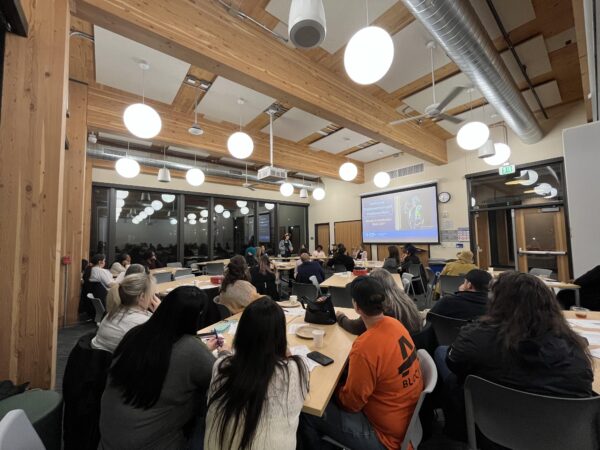 Following Isis’s powerful message, Susan Rodway, Treasurer at IBEW Local 48, moderated a panel discussion with Anjanet Banuelos Bolanos, Business Representative at LiUNA Local 737, Liz Nichols, Business Representative at Cement Masons Local 555, Montana Maurice, Project Engineer at Anderson Construction with Carpenters Local 271, Sharon Maxwell, Owner of Bratton Construction, and Willow Ryan, Co-Chair of Sisters of Iron with Ironworkers Local 29 as they shared about their paths into the trades, experiences with mentors and allies in the industry, and how to take your career to the next level. Three things became clear: Access to pre-apprenticeship training offered a pathway for all these women to find successful careers in construction; Mentors, allies, and a support system in general are crucial for successfully training and retaining women in construction; Women are held to a higher standard than their male counterparts and must go above and beyond to prove their themselves in the field. This panel illuminated the shared experiences of tradeswomen across trades, provided insight into where we are, and painted a picture of what the future could look like if we continue to collaborate on this important work.
Following Isis’s powerful message, Susan Rodway, Treasurer at IBEW Local 48, moderated a panel discussion with Anjanet Banuelos Bolanos, Business Representative at LiUNA Local 737, Liz Nichols, Business Representative at Cement Masons Local 555, Montana Maurice, Project Engineer at Anderson Construction with Carpenters Local 271, Sharon Maxwell, Owner of Bratton Construction, and Willow Ryan, Co-Chair of Sisters of Iron with Ironworkers Local 29 as they shared about their paths into the trades, experiences with mentors and allies in the industry, and how to take your career to the next level. Three things became clear: Access to pre-apprenticeship training offered a pathway for all these women to find successful careers in construction; Mentors, allies, and a support system in general are crucial for successfully training and retaining women in construction; Women are held to a higher standard than their male counterparts and must go above and beyond to prove their themselves in the field. This panel illuminated the shared experiences of tradeswomen across trades, provided insight into where we are, and painted a picture of what the future could look like if we continue to collaborate on this important work.
As Donna Hammond, Interim Executive Director of Oregon Tradeswomen, took the stage, she shared how struck she was by the collective passion and dedication that filled the room. Being a native Portlander born into a strong union family, and someone who became a pioneer for black women in construction in her 40+ years as a Union Electrician, Donna spoke about how humbled and inspired she was to share the stage with so many leaders in the tradeswomen movement. She reminded the crowd that “we convene here today not just as attendees, but as master builders and narrators of our own unique stories.” By sharing and amplifying these stories, Donna says “we lay a foundation for future growth and change in our industry.” Donna also announced a new and exciting partnership between Oregon Tradeswomen, IBEW Local 48, and the Department of Energy to create pathways for African American women and other women of color to enter the skilled trades with a focus on being certified as electrical vehicle changing station installers. We are excited to progress our mission to diversify the trades while providing access to high-wage careers that utilize cutting-edge technology in this new era of green energy infrastructure.
Donna closed out the event by circling back to the theme of the night, asking “Who holds the key?” to which the room exploded in a cheer of “We are the key!” The enthusiasm of the attendees was palpable, and sharing space in this beautiful new building was the perfect way to kick off Women in Construction Week. Thank you to the Women’s Bureau and Portland Community College for collaborating on this inspiring event and showing unwavering commitment to our cause. Together, we hold the key to building a more inclusive future for women in construction.
Statewide Expansion Reaches Lane County
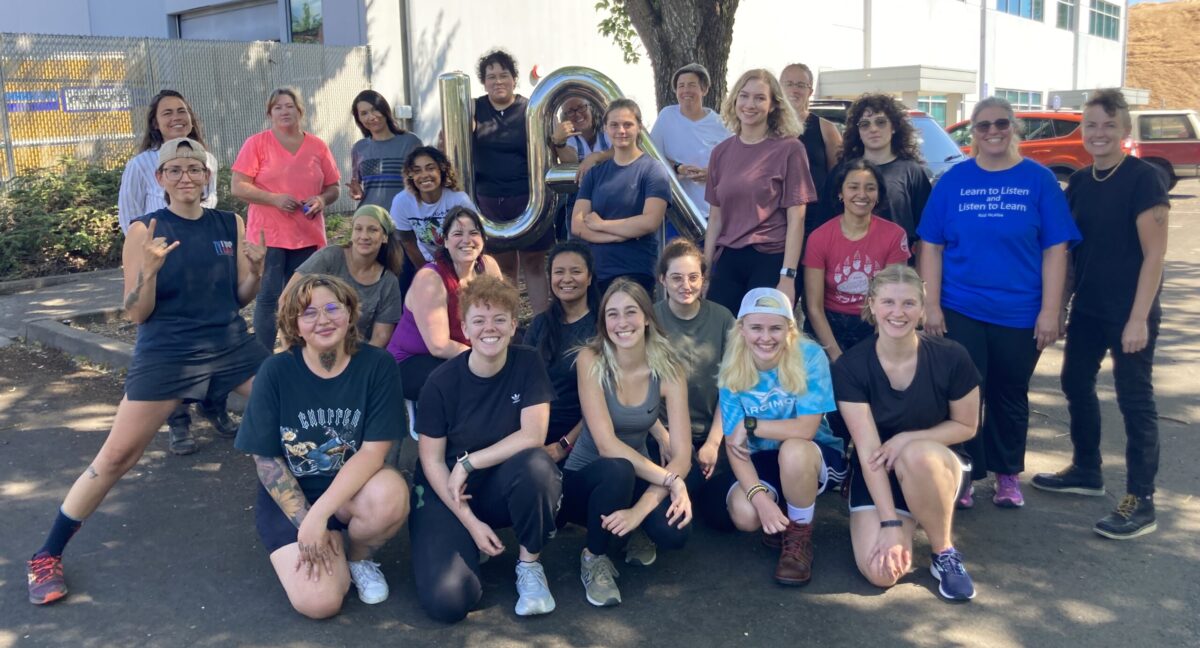
Oregon Tradeswomen continues to expand our pre-apprenticeship training opportunity for women to new communities in Oregon. Our incredible team, and a host of industry partners and supporters, worked hard to bring our Trades and Apprenticeship Career Class (TACC) to Lane County this summer. It’s our largest cohort of students outside of the Portland Metro area so far!
Excited doesn’t even begin to capture our feelings about offering our BOLI-certified pre-apprenticeship training program to even more women and gender minorities across the state of Oregon. Over the 8-weeks of training, these students will be hard at work preparing to take the next step into registered Apprenticeship and a career in the skilled trades!
This new venture would not be possible without the dedication and support of our many partners who helped us get here. Huge gratitude to UA Local 290, for our ongoing partnership, and for hosting our Summer TACC at their state-of-the-art training center in Springfield, Oregon. This cohort of pre-apprentices have a wonderful facility to build a strong foundation of skills and knowledge necessary to succeed in their chosen career in construction.
Oregon Tradeswomen was also thrilled to work with Terry Bierwirth of Second Story Marketing Group to get the word out about our first Lane County training opportunity. Our team first met Terry many years ago as part of her Skilled to Work campaign on KEZI in Eugene. With Second Story Marketing Group as our partner, we were able to recruit the most students we’ve ever had in a statewide pre-apprenticeship offering!
We extend our most sincere thanks to:
Area III Plumbers JATC
Balanced Electric Inc.
Chambers Construction
Connected Lane County
Eugene Builders Exchange
Independent Electrical Contractors Oregon
Lane Education Service District
Lane Workforce Partnership
NAWIC Eugene Chapter #77
Opportunity Oregon
Oregon Employment Department
Pacific Northwest Carpenters Institute
Sheet Metal Institute
Springfield Chamber of Commerce
UA Local 290 College of Mechanical Systems & Technology
WorkSource Oregon Lane
Each of these organizations helped share information about Oregon Tradeswomen’s TAC Class with their networks and community, and a sound reminder of how our collective efforts around a common goal can achieve great things, and that together, we are moving the construction industry into a bright future.
We can’t wait to see the Summer cohort of pre-apprentices develop into skilled tradesworkers who will be building across Oregon!
2023 Women in Construction Week
Women in Construction Week is an annual event started by The National Association of Women in Construction (NAWIC) in 1998 to honor women in the construction industry and promote the opportunities for women in this industry. This year Women in Construction Week falls on March 5 – March 11, making this the 25th year of celebrating women in construction!
This year’s theme is “Many Paths, One Mission,” focusing on the different journeys women have taken toward the goal of strengthening and amplifying the success of women in the construction industry. Join NAWIC, unions, construction firms of all sizes, and organizations like Oregon Tradeswomen in participating in Women in Construction Week events and show support for tradeswomen online!
Women in Construction Week Events
Saturday, March 4:
Women in Construction Week Kick-Off
Monday, March 6:
DE&I Panel: Hot Topic Discussion with Leading Women in Construction
Tuesday, March 7:
Walsh Construction Job Site Tour
Wednesday, March 8 (International Women’s Day):
NAWIC + Dovetail Trunk Show
UA290 + PMCA Women in Construction Week Top Golf Event
Thursday, March 9:
Establish Balance & Avoid Burnout Webinar
Night With NAWIC
Friday, March 10:
Women in Construction Week Build Day @ Habitat for Humanity
Zoom Wine Tasting with Pairings
Saturday, March 11:
Women in Construction Week Toast & ReCap
In Her Own Words: Jen Brallier’s Pathway to Apprenticeship
When Jen Brailler, an educational assistant, reached out to us for help making a career change, our team worked with her to figure out her next steps. From answering her questions, helping her identify which trade was the best fit, and providing support during her apprenticeship application process, Jen got the help and advice she needed to demystify the confusing, and sometimes overwhelming process, to start her new career. Here is Jen’s story in her own words:
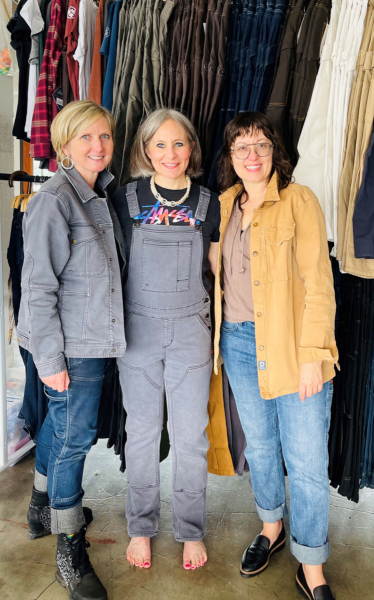
From Left to Right: Sara DeLuca, Dovetail Workwear Founder; Jen Brailler, Apprentice Bricklayer; Rachelle Waldie, Dovetail Workwear
“I have been an Educational Assistant for the Reynolds School District for 17 years, supporting students with special needs. I have so much passion for the work and care deeply for the students and their success. However, over time, there has been a growing lack of support, respect, and resources for the needs of teachers. Because I care so much for the students and have enjoyed my work, it’s been difficult to try for something else for a long time. This was the year that really gave me a kick-start into pursuing something new.
“Working for a school district, we help students with post-high school options often, so I’ve known about the trades for some time. I knew I didn’t want to accumulate loans at this point in my life and that led me to look in to pursuing a trade. I like to build things and get creative in my spare time, so I thought making that a career could be really cool! I learned about Oregon Tradeswomen while researching what trades careers are out there and I decided I would contact them to get a little more information… And I’m so happy I did!!
“Going into something new, I had so many questions for them! I was astonished at the immediate support and responses. Oregon Tradeswomen offers frequent Social Hours full of a lot of wonderful information as well as question and answer sessions, but they also took so much time to help me individually! Oregon Tradeswomen was able to answer pretty much all of my questions, and connected me to people and resources to answer the questions they didn’t have all the answers to. And my goodness, did I have A LOT of questions!
“Some of my many questions were:
Inquiries about application processes, which trades are most physically demanding, what Oregon Tradeswomen’s pre-apprenticeship offers, what gear I might need for a certain trade, how can I best support my health and safety in the work, gathering information and contacts for the trade I am interested in, contacts of people who have been working in a certain trade so that I can ask them about the work, all the forms I needed to have ready for application process, and SO much more!
“I believe through emails alone, Oregon Tradeswomen’s team spent at least 10-12 hours with me – I’m sure more at this point! I eventually secured an interview with BAC Local 1 and I was feeling extremely nervous about it. Oregon Tradeswomen was able to connect me with someone who could help me practice some of the questions that are most commonly asked during the BAC apprenticeship interview! Amazing.
“Oregon Tradeswomen gave me website resources for the clothing lines they partner with to help me get started with brand new work boots and clothing. They even went above and beyond and set up a meeting time with me and Dovetail Workwear for a workwear fitting!
“ALL of the emails and in-person interactions with Oregon Tradeswomen have had a caring, supportive vibe! I haven’t even started my apprenticeship yet, and I already feel so much acceptance and love. I am positively overwhelmed and overjoyed with all that I have received so far.
“The compensation Oregon Tradeswomen gets for their work doesn’t cover the support they gave me, but they still helped me so much because they have hearts of Gold! They need a full-time staff-person who can give the kind of support that I got because it was incredibly helpful and gave me full confidence in pursuing my trade! I wasn’t sure about making this huge leap into a new career, but Oregon Tradeswomen assured me that it would change my life for the better. They motivated me in a way that I have not experienced before. I know I’ve shed some tears from the support, love, and kindness they have shown me! Women going into this type of work NEED the kind of motivation Oregon Tradeswomen offers…
“At 43 years old, I will be starting a Bricklayer Apprenticeship with BAC Local 1 in July! I owe Oregon Tradeswomen most, if not all, of the credit for my firm and confident decision in this New Beginning of my life!
With love,
Jen Brallier”
Future Ready Oregon: A Win for Workforce Equity
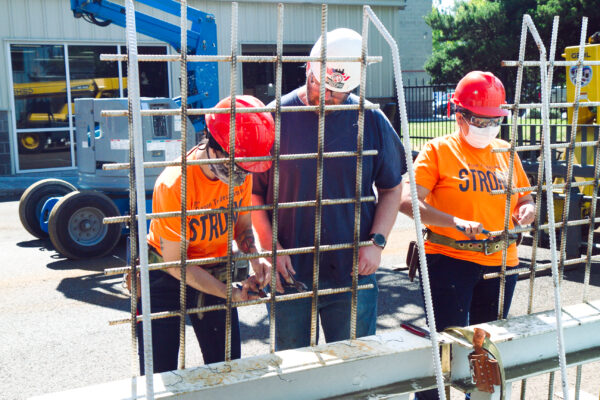
In a tremendous win for workforce training equity, Governor Kate Brown signed the Future Ready Oregon bill into law. Future Ready Oregon is a blueprint for change and an opportunity to build an economy in Oregon that supports all workers in achieving their dreams and building a more prosperous future.
Funding from this bill will create new workforce development programs and expand existing programs in healthcare, technology, manufacturing, and other high-demand sectors while reducing barriers to employment. This investment package will specifically support community college Career Pathways programs, local Workforce Boards, and apprenticeship programs as they expand their capacity to provide free career education and support services to more Oregonians. Funding will also strengthen pre-apprenticeship like Oregon Tradeswomen’s Pathways to Success program that demonstrates strong outcomes for women in construction. Oregon Tradeswomen program graduates start their careers making an average wage of $22.81 per hour.
In addition to supporting and expanding current workforce development programs, Future Ready Oregon encourages innovation by providing Workforce Ready Grants to fund education and training programs in industries lacking accessible career pathways. With these programs, there is a renewed commitment to continuous improvement and accountability by tracking data to measure success outcomes for underserved populations.
Oregon’s Racial Justice Council and the Governor’s Workforce Workgroup helped guide this policy through a lens focused on equity to ensure minority groups like women and people of color are not left out of economic recovery. Oregon Tradeswomen’s Executive Director, Kelly Kupcak, served on the Governor’s Workforce Workgroup and contributed to the proposal which includes the goal of serving at least 50% women through these new and existing programs.
Future Ready Oregon makes much-needed new investments in the programs that help workers overcome barriers to pursuing careers providing economic security through good wages, health insurance, and retirement benefits. These investments will provide resources to offset the costs of support services such as childcare, transportation, and housing stabilization. When quality training is coupled with direct support, workers are successful in securing employment, businesses can meet their labor demands with a qualified workforce, and our communities have a shared prosperity model that works for everyone.
Building Code Boards: CALLING ALL WOMEN
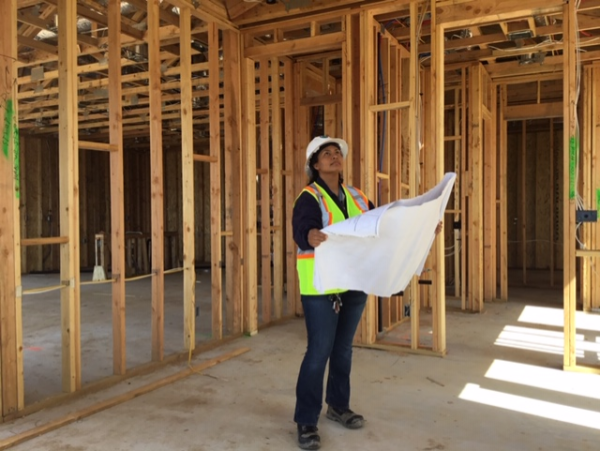
Jennifer Turcios, the city of Santa Clarita first woman inspector. Coutesy of the city of Santa Clarita.
An average person spends approximately 90 percent of their time indoors, yet many of the buildings in which we currently live and work are some of the largest sources of greenhouse gasses, waste energy, and harm our health.
In our time of climate crisis, our homes and buildings become our refuge. State level codes set the standards to make sure our buildings are safe and sustainable places to live, work, and raise our children. By serving on one of these very important boards you can help change an agency and make your voice heard.
Women, and especially women of color, are significantly underrepresented in Oregon’s decision-making processes around building codes. Building energy codes are the primary mechanism in place to regulate energy performance in new construction or major building renovations and they need to hear your voice.
Building Codes?
Building codes are set at the state level in Oregon. They regulate important aspects of fire, life, and safety in new homes and buildings. As a subset of overall building codes, energy codes establish minimum levels of energy performance in these homes and buildings.
Building codes in Oregon are administered by the state Building Codes Division (BCD), alongside legislatively mandated advisory boards. These advisory boards play a vital role in determining the minimum energy efficiency of Oregon’s new homes and buildings. Board members are citizen volunteers representing different construction-related industries.
The boards include the Residential and Manufactured Structures Board (RMSB) focused on low-rise residential dwellings and the Building Codes Structures Board (BCSB) which focuses on commercial buildings. Members are appointed by the governor and subject to confirmation by the Senate. The RMSB consists of 11 members with four-year terms. The BCSB consists of 9 members with four-year terms.
Board Service
Serving on the RMSB and BCSB Advisory Boards is an important role which helps set the direction for how homes and buildings are built in Oregon. In addition to having a voice on key codes decisions, advisory board members interact with construction industry professionals on a range of topics and hear expert testimony on all codes proposals coming before the Advisory Boards. Advisory Board members also interact with State of Oregon Building Codes Division staff.
Historically, the BCD has been reluctant to set codes and standards that will help move Oregon towards creating resilient and climate friendly homes and buildings. With your involvement, that could change.
The Advisory Boards include legislatively mandated representatives from various construction industry specialties:
- “A Representative of residential building trade subcontractor” (RMSB)
- “A Contractor specializing in residential structures” (RMSB)
- “A Contractor specializing in remodeling residential structures” (RMSB)
- “A Public Member” (RMSB)
- “A Representative of the building trade” (BCSB)
The state does not provide any specific experience requirements to serve on Building Codes Boards, but applicants should be able to show they have related work experience for the seat they are applying.
Information and Resources
Residential and Manufactured Structures Board (RMSB)
Building Codes Structures Board
General “Become A Board Member” Information
For more information
Please feel free to reach out with specific questions:
Amy Cortese: amy@newbuildings.org
Anthony Roy: aroy@earthadvantage.org
To apply, please visit:
https://www.oregon.gov/gov/admin/SiteAssets/Pages/How_To_Apply/Interest%20Form.pdf
Workforce Partner Spotlight: Autodesk
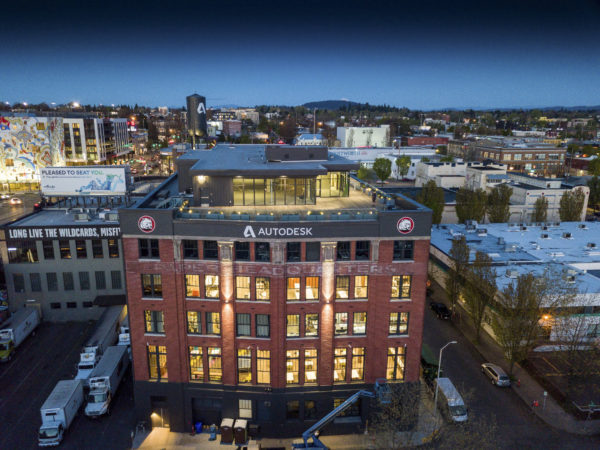
Aerial view of the Autodesk offices in Portland, Oregon.
Oregon Tradeswomen is always grateful to our Workforce Partners for their commitment to a diverse and equitable workforce. When we moved in to our new office space in the Rockwood neighborhood, complete with a workshop for our pre-apprenticeship training program, Autodesk helped us out with a donation including AutoCAD 360 software to help us take our hands-on training to the next level. Autodesk is changing how the world is designed and made. Their technology spans architecture, engineering, construction, product design, manufacturing, media, and entertainment, empowering innovators everywhere to solve challenges big and small. From greener buildings to smarter products to mesmerizing blockbusters, Autodesk software helps their customers to design and make a better world for all.
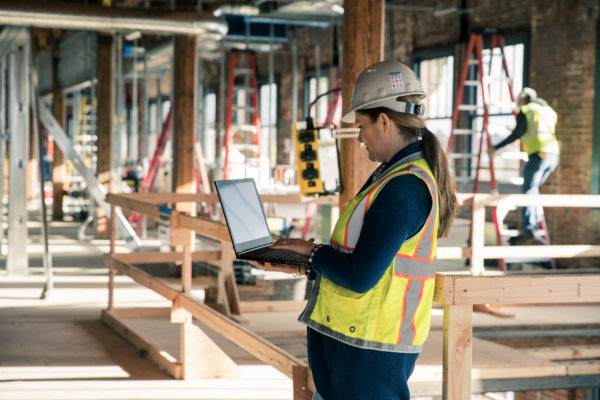
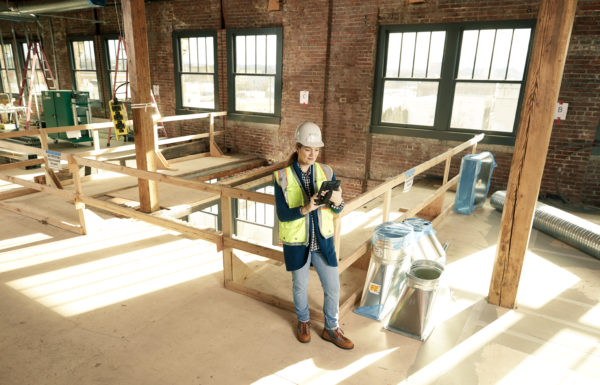
2021 Summer Tool and Gear Swap
For the first time since we moved in to our new office in the Rockwood neighborhood, we opened our doors to the community this August for our Summer Tool and Gear Swap!
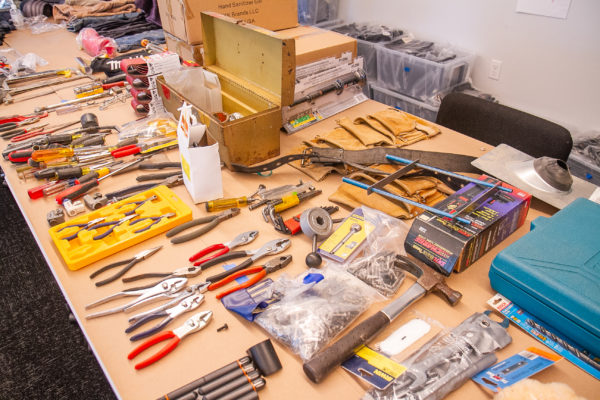
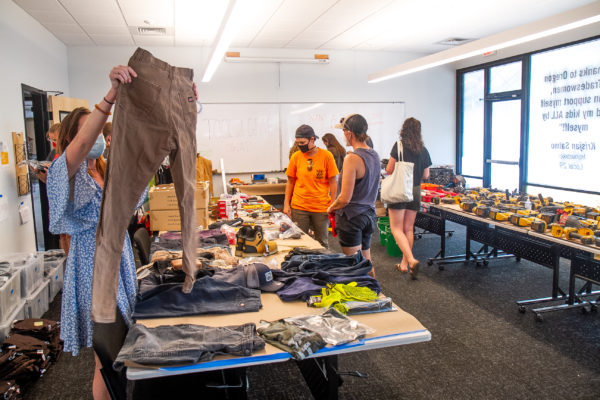
Oregon Tradeswomen continues the tradition of these Tool and Gear Swaps becausebuilding up an arsenal of tools at the beginning of a career in the construction trades can cost hundreds of dollars. This event offers a way for tradeswomen to gather tools they need for free, and it brings our tradesworker community and our new Rockwood community together!
We were thrilled to see such an enthusiastic turnout of graduates and friends of the organization as well as some new friendly faces! It was heartening to witness connections being made and information shared over the selection of tools. One Oregon Tradeswomen graduate even came to the event to help re-build another graduate’s tool library after their equipment was stolen from their car. Whenever our network of tradesworkers come together, it is clear that the bonds that are made under our roof are long-lasting!
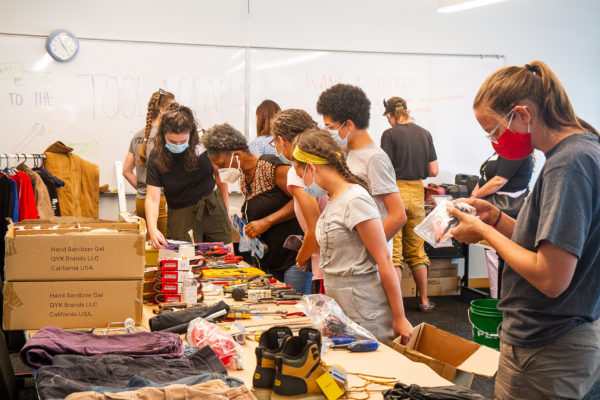
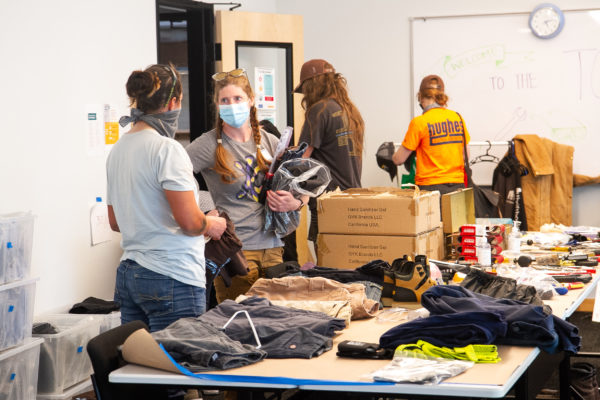
We cannot forget to thank our wonderful business partners Neil Kelly, Knife River, and Milwaukee Tool who provided eager volunteers to help us run the event! We are so grateful for our partners’ willingness to pitch in and make this event run smoothly!
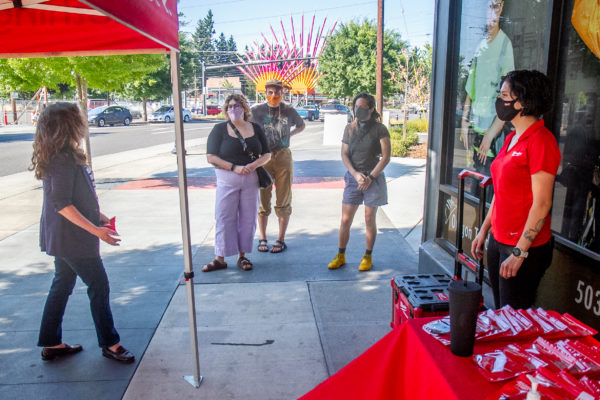
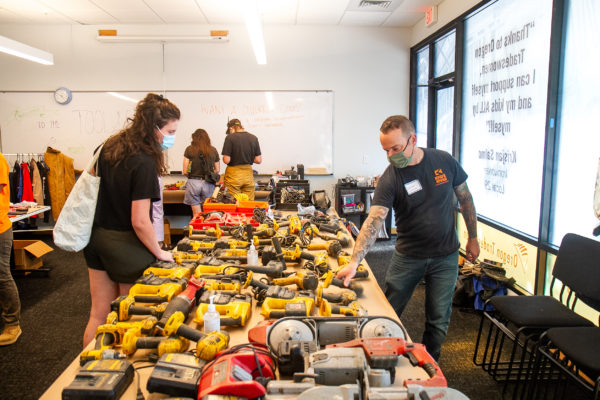
Now that the Tool and Gear Swap is over, we are filled with elation at the strength of our community and absolutely cannot wait to spend more time with you all! Your next opportunity to join the Oregon Tradeswomen community is every third Wednesday of the month at our virtual Social Hours and this October at Build With Us! Oregon Tradeswomen’s Blue Collar Gala! We hope to see you there!
Build Back Better: A visit from U.S. Labor Secretary Marty Walsh
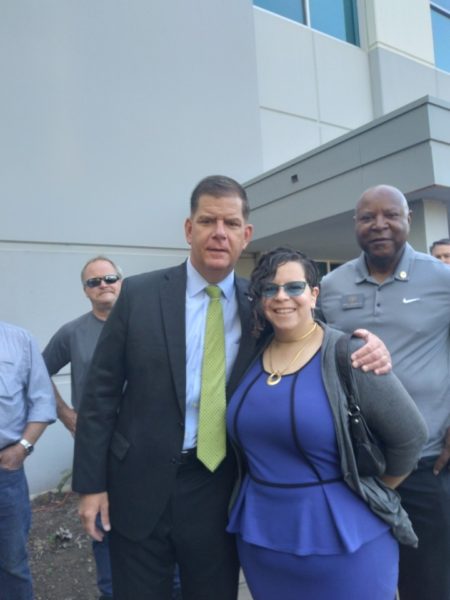
U.S. Labor Secretary Marty Walsh with Oregon Tradeswomen graduate Leslie Cotton
On Tuesday, August 10, 2021, U.S. Labor Secretary Marty Walsh visited Oregon and came to the UA Local 290 Springfield Training Center to talk about the Biden administration’s #BuildBackBetter plan and the goal of building an inclusive, worker-centered economy.
Secretary Walsh was joined by Representative Peter DeFazio, Oregon Labor Commissioner, Val Hoyle, and other labor leaders around the state. Together, they discussed the pending infrastructure bill and how the Biden administration plans to invest in apprenticeship and advancements for workforce equity.
The same day, the U.S. Senate passed a bipartisan physical infrastructure bill including substantive investments in roads, bridges, rail, transit, and utilities. The amendment for workforce equity which would increase access for women and people of color on infrastructure construction jobs was not included in the final bill.
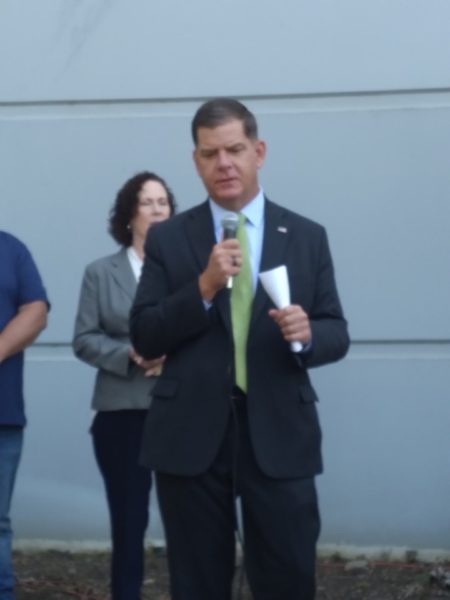
Oregon Labor Commissioner Val Hoyle listens to U.S. Department of Labor Secretary Marty Walsh
Our tradeswomen community will continue to work for equitable access and opportunities for women and people of color in the construction industry and is so appreciative of the Labor Secretary’s visit to advocate for registered apprenticeship, pre-apprenticeship, and infrastructure investments to benefit all workers. When asked by Oregon Tradeswomen’s Executive Director, Kelly Kupcak, about his leadership at the U.S. Department of Labor, he outlined a comprehensive commitment to all workers, migrants, women, disabled persons, veterans, and BIPOC. He concluded by saying “Equity is in my DNA”.
Oregon Tradeswomen is grateful for Secretary Walsh’s leadership and his dedication to equity and fighting for worker dignity on the front lines.
Workforce Partner Spotlight: Streimer Sheet Metal
When Oregon Tradeswomen’s founders came together, the idea of women working in the construction trades was a radical idea. While we are still on the road to a construction workforce with an equal representation of women and men on the job-site, the face of the construction industry is definitely changing.
Much of this shift is a result of the commitment of Oregon Tradeswomen’s Workforce Partners who empower our organization to continue giving women the tools to succeed and who embrace our mission to increase women’s participation on job sites across our region. We are grateful to Workforce Partners like Streimer Sheet Metal who have made an active effort to hire women, including a number of Oregon Tradeswomen graduates.
We spoke with Streimer Sheet Metal’s HR Manager, Teresa Bergan, about why they support Oregon Tradeswomen as a Workforce Partner. Teresa explained, “Streimer supports Oregon Tradeswomen because learning a trade is an educational pathway to a great career choice that raises women above the everyday career. Streimer supports and partners with Oregon Tradeswomen to train women who are looking for a career in the sheet metal craft. Those graduates become employees that become a voice and an ambassador of Streimers’ dedication to excellence and professionalism in the construction industry.”
Oregon Tradeswomen is grateful for Streimer’s commitment to the tradeswomen movement, and their positive impact on the industry. We invite you to meet some of the incredible tradeswomen on their team:
Meet the Women of Streimer Sheet Metal:
